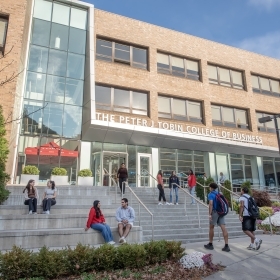How a Master's Degree Can Pave the Way for Your Cybersecurity Career

Cybersecurity jobs are among the fastest growing, with a 33% increase in employment for information security analysts between 2023 and 2033. The rise in demand is due in part to fast-advancing technology and increase in global cybercrime—but it is also due to skill shortages. Employers look for leaders who keep up with the changing technological environment and have the resilience, curiosity, and critical thinking skills to adjust and thrive with change.
Earning a Cyber and Information Security, Master of Science (M.S.) degree helps you meet the market demand and advance in the field. In fact, Cybercrime Magazine reports “cybersecurity remains a near-zero unemployment marketplace for those with extensive backgrounds.”
Do I Need a Formal Education to Succeed in Cybersecurity?
To start out in the field of cybersecurity, there are some key skills required, but an advanced degree may not be necessary. However, to continue to move forward in your cybersecurity career, increasing your responsibility and earning potential, you may find that a master’s degree is essential.
The good news is that programs like the Cyber and Information Security M.S. at St. John’s University is open to students with any undergraduate degree.
Plus, you can choose between full-time, part-time, and hybrid online program options. If you choose to enroll full time, you may be able to earn your M.S. degree in as little as one year.
A cyber and information security master’s prepares you with the skills and certifications you need to pursue roles such as
- Cybersecurity analyst
- Cyber defense professional
- Cybersecurity researcher
- Cybersecurity specialist
- Data security analyst
- Information security analyst
- Information technology security architects
- Network engineer
Transitioning to Cybersecurity: Strategies for Career Changers
Since cybersecurity is a growing field, it’s a great option for those looking to make a career pivot. Career changers looking to get into cybersecurity should
- Evaluate current skill sets and look for gaps.
- Network with those in the field to get a better understanding of the requirements and roles.
- Research cybersecurity programs to determine the best fit.
The Cyber and Information Security, M.S. degree program at St. John’s University accommodates career changers with nontechnical bachelor’s degrees by allowing some required credits in programming and networking science to count for electives inside the 30-credit degree program. For those without the foundational education in programming and networks, prerequisites are also offered and credits from bootcamps and certificate programs may also be accepted.
How to Evaluate the Best Schools for Cybersecurity
Whether you are a career changer or continuing a path in cybersecurity, look for a master’s program at a reputable institution that provides you with the right skills, experience, and certifications.
You can evaluate which are among the best schools for cybersecurity by looking at
- Curriculum quality
- Faculty qualifications and expertise
- Rankings and recognition
- Validation by top security agencies, governmental offices, and experts
NSA Designation
As of February 15, 2024, the M.S. program in Cyber and Information Security at St. John’s University is validated by the US Department of Homeland Security and the National Security Agency as a Program of Study in Cybersecurity through academic year 2029.
How to Gain Practical Cybersecurity Experience: Opportunities at St. John's University
A Cyber and Information Security, Master of Science (M.S.) provides you not only with the foundational skills and education needed to be a strong candidate in the market; it also provides you with resources to build your résumé and get hands-on experience.
At St. John’s University, these resources include
- Cybersecurity Internships—University Career Services and cybersecurity faculty at St. John’s work with you to identify, prepare for, and interview for cybersecurity internships at top employers across the country.
- Events, Seminars, and Networking—You can hear from top industry professionals and network with employers, leaders, and peers in cybersecurity at campus events.
- The Cyber Security Center of Academic Excellence—A hub of interdisciplinary research, education, and training, the Cyber Security Center allows you to collaborate with peers and faculty to pursue cyber and information security projects and research.
- Sanford Family Cyber Security Lab—Learn, apply, and practice software and employ techniques for intrusion detection, vulnerability mitigation, network perimeter defense, incident response, network forensics investigation, and malware analysis.






